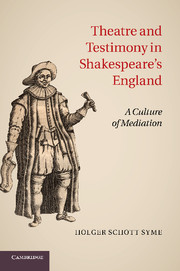Book contents
- Frontmatter
- Contents
- Illustrations
- Acknowledgments
- Textual note
- Abbreviations
- Introduction: The authenticity of mediation
- Chapter 1 Trial representations
- Chapter 2 Judicial digest
- Chapter 3 Performance anxiety
- Chapter 4 Royal depositions
- Chapter 5 The reporter’s presence
- Epilogue: The theatre of the twice-told tale
- Select bibliography
- Index
- References
Chapter 4 - Royal depositions
Richard II, early modern historiography, and the authority of deferral
Published online by Cambridge University Press: 05 March 2012
- Frontmatter
- Contents
- Illustrations
- Acknowledgments
- Textual note
- Abbreviations
- Introduction: The authenticity of mediation
- Chapter 1 Trial representations
- Chapter 2 Judicial digest
- Chapter 3 Performance anxiety
- Chapter 4 Royal depositions
- Chapter 5 The reporter’s presence
- Epilogue: The theatre of the twice-told tale
- Select bibliography
- Index
- References
Summary
Richard II brings two central subjects of the previous chapters together: the Earl of Essex and the theatre’s power to conjure the real. On 7 February 1601, the eve of the Essex rising, some members of the earl’s circle paid the Lord Chamberlain’s Men to stage a special performance of Shakespeare’s play (or another on the same subject). It is no longer possible to say exactly what motivated these playhouse rebels, but it seems clear that they were seeking some kind of inspiration in the past, and hoped that the theatrical enactment of that past would produce an effect in the present. It also seems clear that – as Shakespeare might have predicted – their project failed. The players’ judgment that the text was ‘so old & so long out of vse’ that it would be unpopular and unappealing to audiences proved accurate at least in the sense that the performance did not stir up any kind of tangible support for Essex.
The gathering at the Globe was subsequently portrayed by the government as the rebels’ attempt to conjure up parallels between Elizabeth and the deposed king. The most famous instance of this allegorical or analogical understanding of historiography is the queen’s alleged self-identification with her predecessor (‘I am Richard II. know ye not that?’), but the connections between the royal comment and Shakespeare’s play are unclear at best. A less well-known but for my purposes more intriguing remark is Francis Bacon’s charge, in his official account of the rebellion, that Sir Gelly Merrick wanted ‘to satisfie his eyes with the sight of that tragedie’. The staging of events of the past is supposed to have a pleasurable effect on the rebel mind – the aesthetic achievement of a tragedy and the artistic skill involved in making Sir Gelly see absent people and things are here cast as distinct from and ancillary to the specific joy the conspirator allegedly hoped for, a joy that follows the successful recreation of the past and requires the application of those newly present historical events to contemporary circumstances. Slightly less insidiously, part of the attraction for Essex’s men may simply have been ‘the prospect of seeing ancestors played “to the life”’, as Paul Hammer has argued. In any case, both prosecutors and rebels appear to have shared the belief that the stage had the power to bring the past to life in ways that could be appropriated by audience members in precisely the way Jonson regularly decried. Mediated through a well-constructed (if old and unfashionable) play and by a troupe of skilled actors, the events of Richard II’s reign could be witnessed again, lamented again, enjoyed again, and experienced as precursors to the present.
- Type
- Chapter
- Information
- Theatre and Testimony in Shakespeare's EnglandA Culture of Mediation, pp. 153 - 204Publisher: Cambridge University PressPrint publication year: 2011



